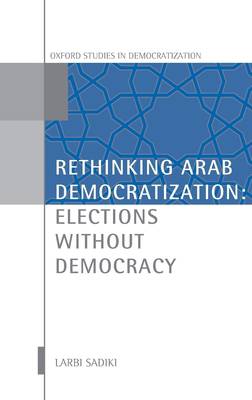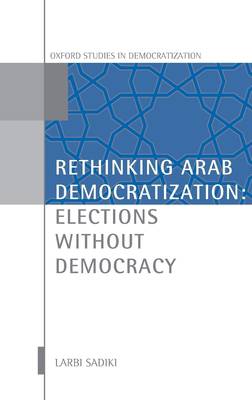
En raison d'une grêve chez bpost, votre commande pourrait être retardée. Vous avez besoin d’un livre rapidement ? Nos magasins vous accueillent à bras ouverts !
- Retrait gratuit dans votre magasin Club
- 7.000.000 titres dans notre catalogue
- Payer en toute sécurité
- Toujours un magasin près de chez vous
En raison de la grêve chez bpost, votre commande pourrait être retardée. Vous avez besoin d’un livre rapidement ? Nos magasins vous accueillent à bras ouverts !
- Retrait gratuit dans votre magasin Club
- 7.000.0000 titres dans notre catalogue
- Payer en toute sécurité
- Toujours un magasin près de chez vous
Description
Rethinking Arab Democratization unpacks and historicizes the rise of Arab electoralism, narrating the story of stalled democratic transition in the Arab Middle East. It provides a balance sheet of the state of Arab democratization from the mid-1970s up to 2008. In seeking to answer the question of how Arab countries democratize and whether they are democratizing at all, the book pays attention to specificity, highlighting the peculiarities of democratic transitions in the Arab Middle East. To this end, it situates the discussion of such transitions firmly within their local contexts, but without losing sight of the global picture, namely, the US drive to control and democratize' the Arab World. Rethinking Arab Democratization rejects exceptionalism', foundationalism', and Orientalism', by showing that the Arab World is not immured from the global trend towards political liberalization. But by identifying new trends in Arab democratic transitions, highlighting their peculiarities and drawing on Arab neglected discourses and voices, it pinpoints the contingency of some of the arguments underlying Western theories of democratic transition when applied to the Arab setting. Oxford Studies in Democratization is a series for scholars and students of comparative politics and related disciplines. Volumes concentrate on the comparative study of the democratization process that accompanied the decline and termination of the cold war. The geographical focus of the series is primarily Latin America, the Caribbean, Southern and Eastern Europe, and relevant experiences in Africa and Asia. The series editor is Laurence Whitehead, Official Fellow, Nuffield College, Oxford University.
Spécifications
Parties prenantes
- Auteur(s) :
- Editeur:
Contenu
- Nombre de pages :
- 344
- Langue:
- Anglais
- Collection :
Caractéristiques
- EAN:
- 9780199562985
- Date de parution :
- 15-04-09
- Format:
- Livre relié
- Format numérique:
- Genaaid
- Dimensions :
- 156 mm x 234 mm
- Poids :
- 657 g

Les avis
Nous publions uniquement les avis qui respectent les conditions requises. Consultez nos conditions pour les avis.






